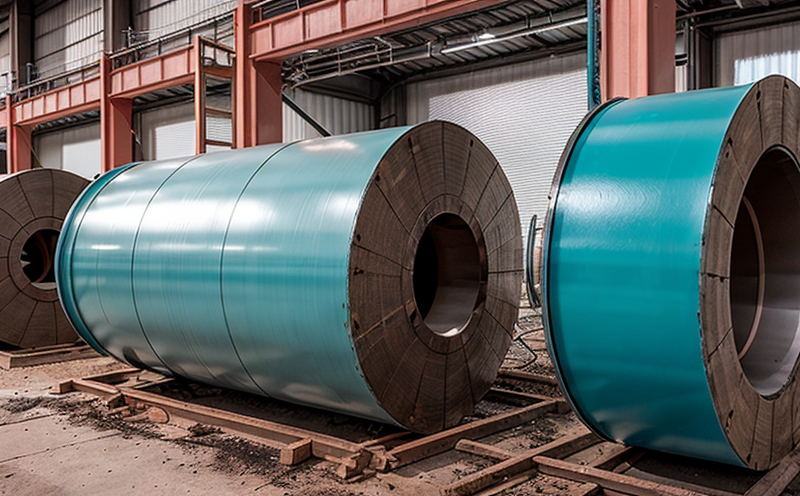ISO 17872 Cyclic Humidity Durability Testing
The ISO 17872 cyclic humidity durability testing is a critical procedure used in industrial manufacturing and processing to evaluate the corrosion resistance and durability of materials under fluctuating environmental conditions. This test simulates real-world conditions where materials are exposed to varying levels of humidity, which can significantly affect their performance over time. The standard ensures that components and materials meet specified requirements for reliability and longevity.
The cyclic humidity durability testing protocol involves exposing the specimen to a series of predefined temperature and relative humidity cycles. This method closely mimics the environmental stresses encountered in industrial settings such as manufacturing plants, processing facilities, and outdoor storage environments. By simulating these conditions, manufacturers can identify potential weaknesses or vulnerabilities in their materials before they enter production.
The testing process typically begins with careful specimen preparation, which includes cleaning, conditioning, and marking the sample according to ISO 17872 guidelines. Once prepared, the specimens are placed into a controlled environment chamber where humidity levels are systematically varied over time. The duration of each cycle and the number of cycles can vary depending on the material being tested and the desired outcome.
Instrumentation used in this testing includes precision temperature and humidity controllers, data loggers for continuous monitoring, and visual inspection equipment to assess any changes in the specimens' appearance or physical properties after exposure. After completing all cycles, the samples undergo thorough analysis to determine their resistance against corrosion and degradation.
The results of ISO 17872 testing are essential for ensuring compliance with industry standards and regulations while also providing valuable insights into material behavior under extreme conditions. This information is crucial for quality managers, R&D engineers, and procurement teams who need accurate data about the performance characteristics of their materials.
For instance, this type of testing can help identify which materials are best suited for certain applications, such as those exposed to high humidity levels in tropical regions or coastal areas. By using ISO 17872 cyclic humidity durability tests early in the product development cycle, companies can make informed decisions about material selection and design improvements that enhance overall performance.
Moreover, this testing contributes significantly to improving sustainability practices by helping manufacturers select more durable materials that require less frequent replacement or maintenance. In summary, ISO 17872 cyclic humidity durability tests play an important role in ensuring reliable product performance across various industrial sectors.
- Environmental Stress: The test simulates the fluctuating environmental stresses experienced by materials in real-world conditions.
- Material Selection: Helps manufacturers choose appropriate materials for specific applications based on their durability and corrosion resistance.
- Data Accuracy: Provides precise data regarding material performance under extreme humidity levels, aiding informed decision-making.
Benefits
Implementing ISO 17872 cyclic humidity durability testing offers numerous advantages to industrial manufacturers and processors. One key benefit is enhanced product reliability, which translates into reduced downtime and increased operational efficiency. By identifying potential issues early in the development process, companies can implement necessary modifications before mass production begins.
The test also promotes sustainability by encouraging the use of longer-lasting materials that need fewer replacements over time. This not only reduces waste but also lowers overall costs associated with maintenance and replacement parts. Additionally, compliance with industry standards ensures that products meet regulatory requirements, thereby protecting companies from costly fines or recalls.
For quality managers and R&D engineers responsible for new product launches, this testing provides crucial data that informs design decisions. With accurate information about material performance under various conditions, teams can optimize designs to better withstand environmental challenges while maintaining aesthetic appeal and functionality.
In terms of procurement strategies, suppliers who demonstrate consistent reliability through successful ISO 17872 tests are more likely to secure long-term contracts due to their proven track record. Overall, investing in this type of testing demonstrates a commitment to quality assurance and continuous improvement within the organization.
Customer Impact and Satisfaction
The implementation of ISO 17872 cyclic humidity durability testing has a direct positive impact on customer satisfaction by ensuring that the products they purchase are reliable and long-lasting. Manufacturers who incorporate this test into their quality assurance processes can expect higher levels of customer satisfaction due to fewer product failures and extended service life.
Clients appreciate knowing that their supplier adheres to international standards like ISO 17872, as it demonstrates a commitment to excellence in manufacturing practices. This trust fosters stronger relationships between suppliers and customers, leading to repeat business and positive word-of-mouth recommendations. Furthermore, satisfied customers are more likely to recommend the product to others, resulting in increased market share for the supplier.
By investing in ISO 17872 cyclic humidity durability testing, manufacturers can build a reputation as leaders in their field, attracting both domestic and international clients seeking high-quality products. This enhances brand perception and loyalty among existing customers while opening doors to new opportunities within competitive markets.
Competitive Advantage and Market Impact
The adoption of ISO 17872 cyclic humidity durability testing provides significant competitive advantages for industrial manufacturers and processors. By demonstrating superior product performance through rigorous testing, companies can differentiate themselves from competitors who may not adhere to such stringent standards.
This approach allows organizations to position themselves as industry leaders focused on delivering reliable solutions that meet or exceed customer expectations. It also enables them to command premium pricing for their products, reflecting the added value derived from thorough quality control measures.
Furthermore, compliance with ISO 17872 can open up access to lucrative export markets where stringent import regulations are in place. Demonstrating adherence to global standards such as these increases the likelihood of winning contracts and expanding into international territories.
Achieving competitive differentiation through advanced testing methods like ISO 17872 contributes not only to short-term gains but also long-term sustainability by fostering innovation and continuous improvement across all aspects of business operations. As a result, companies that embrace these practices are well-positioned to thrive amidst evolving market dynamics.





